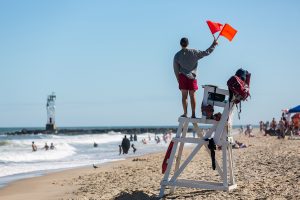
OCEAN CITY — Hitting mid-August, the Ocean City Beach Patrol still has a full complement of lifeguards maintaining the stands, but planning for the annual education drain in the remaining weeks of summer continues to be a moving target.
Each August, the Ocean City Beach Patrol, like most resort enterprises, starts to feel the education drain as many employees start to trickle back to school. The situation is more acute for the OCBP because its leadership staff is largely comprised of teachers, college professors and school administrators and the rank-and-file crews are largely made up of college students and even high school students.
As a result, each summer the OCBP starts to see its number of available staff start to dwindle, resulting in fewer stands manned on the beach and modified deployment plans supplemented with surf rescue technicians (SRTs) on all-terrain vehicles filling in the gaps. Thus far, the OCBP has not yet felt the education drain and has maintained a full complement of SRTs in the stands. Indeed, a check of Thursday’s daily OCBP report revealed all of the manned lifeguard stands, roughly 90 from the Inlet to the Delaware line, were covered.
This year, however, planning for the annual education drain has been a moving target under the current COVID-19 situation. Public school systems in Maryland and around the region are now just finalizing plans on what the start of the 2020 school year will look like. Most are planning to start the 2020-2021 school year in the same virtual format in which they closed out the spring, while others are going with a hybrid format.
The same situation is playing out at colleges and universities around the region from which the OCBP draws much of its staff including a lot of its top-ranking officers. Longtime OCBP Captain Butch Arbin said this week the ever-changing plans are creating challenges in determining how many SRTs and officers will be available down the stretch and how to plan for deployments.
“Unfortunately, we are having difficulty in getting firm information,” he said. “Most of our teachers, including myself, have not been given clear instruction on what we are doing with our students or what our expectations are for returning to school buildings.”
It’s not a unique situation and occurs every year around this time, but will become more challenging in the weeks ahead because of the uncertainties surrounding COVID-19. Although it hasn’t been updated and the numbers may have changed, a study was conducted recently to determine just how top heavy the OCBP is with educators.
Arbin himself is a long-time educator with the Charles County Public Schools system. Two OCBP lieutenants are educators, and of the 12 sergeants on staff, eight are educators and two are college professors. According to the same study, there were 18 crew chiefs, of which eight were educators and two were college professors. That doesn’t even account for the rank-and-file SRTs manning the stands, of which most are college and high school students.
Arbin said this week figuring out what will happen with his leadership staff and rank-and-filers who would normally be heading back to college right now is creating even more challenges.
“Also, colleges are all over the place with what they are proposing and some of that has changed several times,” he said. “One situation was William and Mary, which said once a student arrives on campus, they may not leave. This cuts out some of our weekend SRTs although the town is allowing a travel stipend again this season after this coming weekend.”
With so many of the OCBP’s staff either teachers, administrators or students, the bonus is many can return on the weekends through the end of summer and into September. During the week, the distance between manned stands grows wider and the OCBP and more SRTs on mobile rescue units are deployed to patrol the beach and assist with coverage. One thing the OCBP has going for it this year is it started the season with more lifeguards and staff available than in years past, which is quite a departure from the severe labor shortage experienced by the private sector this summer.
Arbin said despite the uncertainties surrounding COVID this spring and what the summer season in Ocean City would look like, he and his leadership staff continued to recruit, hire and train SRTs as if the situation was going to be normal, resulting in an abundance of available staff greater than in some other years. As a result, when the education drain starts, the OCBP is in a better position than it has been in other recent years.
“We will have to spread out some, but this season, we had more staff than in many other seasons, so as we lose some, we will still have more than most years,” he said. “We will do a modified patrol after Labor Day, but with it being so late this year, that makes it harder.”

